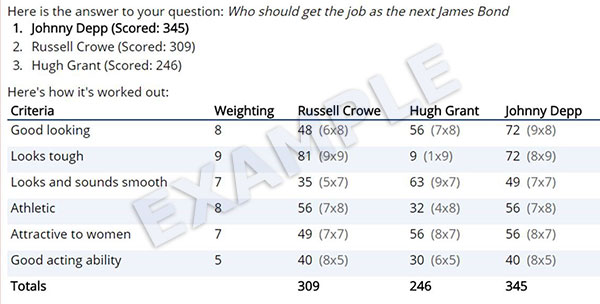Making 'Which one?', 'What kind?' Decisions
Making Good Decisions - Making 'Which one?', 'What kind?' Decisions
There are many, Which one? What kind? decisions to make.
- Which one, what kind of dog should I have?
- Which one, what kind of computer should we get?
- Which one, what kind of holiday should we go on?
In order to make a “which one, what kind?" decision, take the following steps.
- Name the question. For example: Which one, what kind of car should I buy?
- Name the positive criteria
- Rank each of the criteria for importance
- List your top contenders
- Rank candidates against each of the criteria
When you have finished this decision-matrix you will have a decision that will look similar to this:

What are you making a decision about?
Start your question with 'Which one...', or 'What kind...'
Name the positive criteria
Think about your perfect ideal and name the qualities that each of your options would need to have.
Make sure each quality is worded in a positive manner.
For example, when thinking about buying your next car, a negative quality might be:
"I don't want to die in a crash." But instead, write: "It must have a high safety specification."
A second example: "I don't want to struggle getting the bags in the car." would be written as: "It must have a large boot."
Other positive criteria for a new car could be:
- High degree of comfort
- Good acceleration
- Low emissions
- High resale value
Write down all the positive criteria you are going to use in order to make your choice.
You will need at least three, we would suggest no more than 10.
Your question: What kind of [X] should I buy?
Enter a positive criteria:
Positive Criteria:
- Nothing yet!
When you've thought of all the positive criteria, press:
Rank each of the criteria for importance.
Your question: What kind of [X] should I buy?
Drag the slider to the correct value (or tap on a mobile device).
10 meaning "extremely important", 1 meaning "of only minor importance".
Out of ten, rank the following criteria:
Criteria
List your top contenders
Now think about which are the top contenders in answer to your question: What kind of [X] should I buy?
We would suggest between 2 and 6. In our car example, the contenders might be: 'Ford Focus', 'Audi A3', 'Porsche 911'.
Enter a contender:
Contenders:
- None yet!
When you've thought of all the contenders, press:
Rank your candidates against each of the criteria
Your question: What kind of [X] should I buy?
How does the current candidate: Candidate
Rank for the criteria: Criteria?
Here is the answer to your question:
I should do [X]?
Here's how it's worked out:
You may benefit from attending our time management course.
Are you making a different type of decision? We have other decision making apps available for you to use - find out more here.








